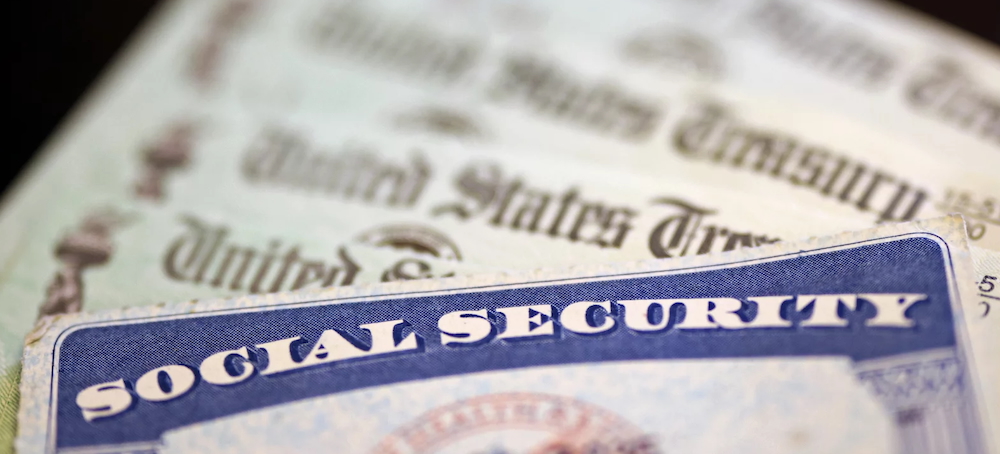Who Loses if Social Security Breaks
Emily Peck Axios "More than 72.5 million Americans rely on Social Security for benefits." (photo: Kevin Dietsch/Getty Images)
"More than 72.5 million Americans rely on Social Security for benefits." (photo: Kevin Dietsch/Getty Images) Who Loses if Social Security Breaks
Emily Peck AxiosWhy it matters: The cuts underway could wind up breaking critical parts of a system that millions of the nation's most vulnerable citizens rely on, including nearly 90% of Americans over age 65.
The big picture: Monkeying with Social Security was always viewed as a "third rail" in politics, even before an aide to House Speaker Tip O'Neill coined the phrase in the early 1980s.
- Many presidents have tried to reform the system in ambitious ways, but the costs were always too great, perhaps until now.
State of play: The agency announced last month it seeks to cut about 7,000 employees, or 12% of staff, through voluntary resignations and a reduction-in-force plan due Thursday.
- Employees have been fleeing, resulting in "a significant loss of expertise," former staffer Tiffany Flick said in an affidavit filed late last week.
The agency also announced plans to shutter six of 10 regional offices.
- Also closed? The office inside the agency that had been tasked with moving some of these processes online, the Office of Transformation.
- "That office was doing what DOGE purports to do," said Kathleen Romig, director of Social Security and disability policy at the Center on Budget and Policy Priorities, who worked at the agency for years under different administrations, most recently in the Biden administration.
DOGE has also gained access to crucial systems, packed with private data that Flick and others said the group doesn't have the expertise to handle.
- Some systems rely on very old programming languages, Flick said in her affidavit, and are vulnerable to being broken by inadvertent user error.
Between the lines: Most federal agencies operate largely outside of view of everyday Americans.
- The Social Security Administration is different. Its staff primarily handle customer service, connecting with the public at vulnerable life moments, such as the decision to retire, or when you can't work because of illness or injury, or when your spouse or parent has died.
Context: There's no doubt there are ways the agency could be made more productive and efficient, according to Andrew Biggs, a senior fellow at the American Enterprise Institute, who has long pushed to overhaul the system, dating back to his time working in the Bush administration.
- "I just find it hard to accept that you can go in there having been there just a few weeks, and do these far reaching changes, having fully thought out the consequences of them," he said.
- That doesn't mean benefits will be disrupted, he said. Those checks are handled by automation. Claims to the contrary are likely overblown.
- That said, disruptions to customer service are possible. "It's kind of a foot race between whether they can improve service before these cuts are impacting service," Biggs said.
The White House has said it wants to root out "waste, fraud and abuse" in Social Security. Other than that, Social Security won't be touched, the administration reiterated in a press release Tuesday.
- "Any American receiving Social Security benefits will continue to receive them. The sole mission of DOGE is to identify waste, fraud, and abuse only," White House press secretary Karoline Leavitt said in a statement to Axios.
- Elon Musk and President Trump have made repeated debunked claims that droves of dead people are getting checks.
- Musk has described the program as a Ponzi scheme lousy with fraud, and has repeated a conspiracy theory that undocumented immigrants receive payments. In fact, they pay Social Security taxes — more than $25 billion in 2022, according to one estimate — but do not collect benefits.
The intrigue: The Social Security administration was already struggling to provide customer service to Americans before these recent cuts.
- The worry now is the changes will worsen the situation, though the administration said its intent is the opposite.
By the numbers: Amid staffing shortages, it's taking the agency longer to make decisions on disability benefit applications.
- This year, folks are waiting an average of 240 days to hear back, up from 120 days before the pandemic, according to agency data analyzed by the Urban Institute.
What they're saying: "You pay into the system, you become disabled and it's time to get your benefit, but you have to wait eight months at best or possibly years," said former official Romig.
- "What good is it? Do you lose your house in the meantime? What good is a benefit you can't access. That's a major problem."
The bottom line: Moving fast and breaking things isn't a huge deal when the thing is a social media site. Social Security is a whole other story.
